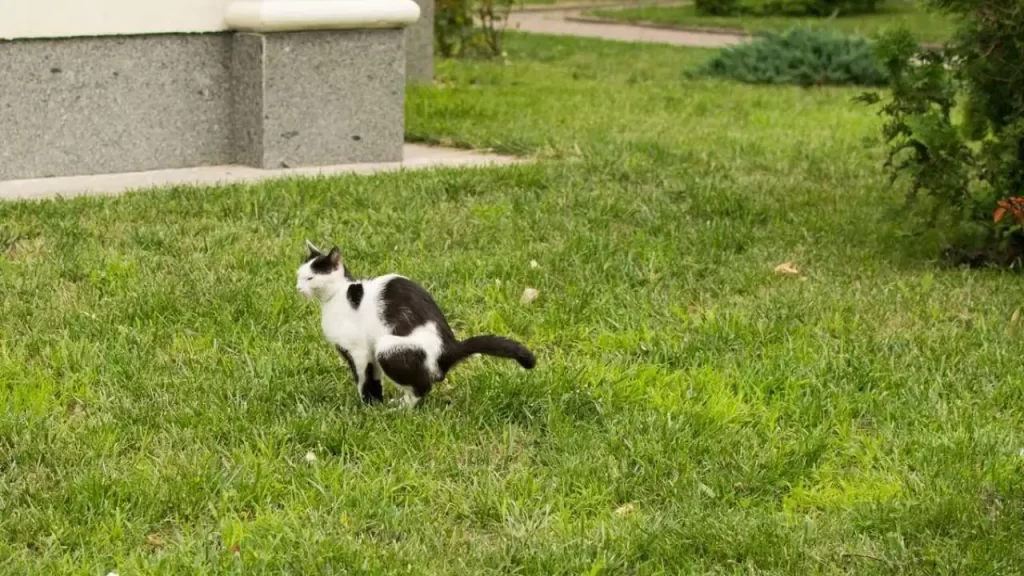If you are tired of finding cat feces in your yard, you are not alone. Many homeowners face this problem and wonder how to stop cats from pooping in their yards.
Cats may choose your yard as their bathroom for various reasons, such as looking for food, shelter, or territory.
However, cat poop can pose health risks to humans and pets, as well as damage your lawn and garden.
Fortunately, there are some effective solutions you can try to prevent cats from pooping in your yard and keep them away for good.
Understanding the Problem: Neighbor’s Cat Pooping in Your Yard
Before you try to solve the problem, it is important to understand why cats poop in your yard and what are the potential consequences.
Health Concerns
Cat feces can contain harmful parasites, bacteria, and viruses that can infect humans and pets. Some of these include toxoplasmosis, roundworms, hookworms, salmonella, and E. coli.
These can cause symptoms such as fever, diarrhea, abdominal pain, muscle aches, and eye problems. Children, pregnant women, elderly people, and people with weakened immune systems are especially vulnerable to these infections.
Therefore, it is essential to wear gloves and wash your hands thoroughly after handling cat feces or soil contaminated by it.
Property Damage
Cat feces can also damage your lawn and garden by leaving unsightly stains, odors, and holes.
Cat poop can also attract other pests such as flies, rodents, and maggots that can further harm your plants and soil.
Moreover, cat urine can burn your grass and kill your flowers due to its high acidity and ammonia content.
Why do cats do it?
Cats are territorial animals that use their feces and urine to mark their territory and communicate with other cats.
They may also poop in your yard if they find it comfortable, convenient, or similar to a litter box.
For example, cats may prefer dry, sandy soil or mulch so that they can easily dig and cover their waste.
Cats may also poop in your yard if they are looking for food or shelter in your trash cans or under your porch.
Effective Solutions for Preventing Cats from Pooping in Your Yard
There are several ways you can deter cats from pooping in your yard without harming them or breaking the law. Here are some of the most effective ones:
1. Use natural deterrents such as chili powder, citrus peels, and coffee grounds
Cats have a keen sense of smell and taste that they use to explore their environment. However, they also dislike certain smells and tastes that humans may find pleasant or harmless. You can use this to your advantage by spreading natural deterrents around your yard that will repel cats from entering or staying there. Some of these include chili powder, cayenne pepper, black pepper, garlic powder, citrus peels (such as lemon or orange), coffee grounds, vinegar, and essential oils (such as lavender or eucalyptus). Sprinkle these substances around the areas where cats poop or along the perimeter of your yard. You may need to reapply them after rain or watering.
2. Install a motion-activated sprinkler system
Another way to keep cats from pooping in your yard is to scare them away with water. Cats hate getting wet and will avoid places where they get sprayed by water unexpectedly. You can install a motion-activated sprinkler system that will detect any movement in your yard and spray water at the intruder. This will startle the cat and make it run away quickly. You can also adjust the sensitivity and range of the sprinkler system to target specific areas or times of the day.
3. Create physical barriers such as mesh fences or thorny bushes
Cats are agile climbers and jumpers that can easily overcome most fences. However, you can create physical barriers that will make it difficult or uncomfortable for them to enter or cross your yard. For example, you can use mesh fences that have small holes that cats cannot penetrate or climb over. You can also use chicken wire or plastic spikes that look like barbed wire but do not harm the cat. These will prevent the cat from sitting on or climbing over the fence. Alternatively, you can plant thorny bushes such as roses or holly along the border of your yard that will prick the cat if it tries to pass through.
4. Plant cat-repellent plants such as lavender and pennyroyal
Some plants have natural properties that repel cats from your yard. These plants emit strong smells that cats find unpleasant or toxic. You can plant these plants in your garden or around your yard to create a natural barrier that will keep cats away. Some of these plants include lavender, rosemary, mint, pennyroyal, rue, geranium, and coleus. However, be careful not to plant these plants near your own pets or children, as some of them may be harmful if ingested.
5. Use noise deterrents such as ultrasonic devices or wind chimes
Cats are also sensitive to noise and will avoid places where they hear loud or unpleasant sounds. You can use noise deterrents such as ultrasonic devices or wind chimes to create an unwelcoming environment for cats in your yard. Ultrasonic devices emit high-frequency sounds that are inaudible to humans but annoying to cats. You can place these devices around your yard or near the areas where cats poop. Wind chimes produce soft but unpredictable sounds that will startle and scare away cats. You can hang them from trees or fences around your yard.
Talking to Your Neighbor About the Issue
If you know who owns the cat that is pooping in your yard, you may want to talk to them about the issue and try to find a solution together. Here are some tips on how to approach this conversation:
1. Determine a good time to talk
Choose a time when you and your neighbor are both calm and relaxed. Avoid talking when you are angry, frustrated, or busy. Also, avoid talking when the cat has just pooped in your yard, as this may make you more emotional and less rational.
2. Approach the situation calmly
Start the conversation with a friendly greeting and a compliment. For example, you can say something like “Hi, I’m (your name), I live next door. I really like your cat, it’s very cute.” This will help establish rapport and goodwill with your neighbor and make them more receptive to what you have to say.
3. Explain the problem and show evidence
Next, explain the problem in a clear and polite way. Avoid accusing or blaming your neighbor or their cat. Instead, use “I” statements and focus on how the problem affects you and your property.
For example, you can say something like “I have a problem with cat poop in my yard. It’s causing health risks for me and my family, as well as damaging my lawn and garden. Here are some photos of the poop I found in my yard.” Show your neighbor the evidence of the problem and explain why it bothers you.
4. Propose potential solutions together
After explaining the problem, ask your neighbor for their input and suggestions on how to solve it.
Listen to their perspective and try to understand their point of view. Be respectful and empathetic, but also firm and assertive.
Try to find a solution that works for both of you and benefits both of your properties. For example, you can say something like “What do you think we can do to prevent this from happening again?
Maybe you can keep your cat indoors more often, or provide it with a litter box outside? I’m also willing to try some deterrents in my yard if that helps.”
Maintaining a Cat-Free Yard
Once you have implemented some of the solutions above, you may need to do some maintenance work to keep your yard cat-free. Here are some tips on how to do that:
1. Regularly clean up any existing feces
Even if you have deterred cats from pooping in your yard, you may still find some feces left behind from previous visits. It is important to clean up any existing feces as soon as possible, as they may attract more cats or other pests. Wear gloves and use a shovel or a plastic bag to scoop up the feces and dispose of them properly. Wash your hands thoroughly afterward.
2. Create designated areas for cats to use for elimination
If you have your own cat or want to help stray cats in your neighborhood, you can create designated areas for them to use for elimination in your yard. This way, they will not poop in other areas that you want to keep clean and tidy.
You can create these areas by filling a large container with sand or soil and placing it in a shaded spot away from your house or garden. You can also add some catnip or catmint plants around the container to attract cats and make them feel comfortable.
3. Encourage your own pets to mark their territory in the yard
If you have a dog or another cat that lives with you, you can encourage them to mark their territory in your yard by peeing or pooping there.
This will send a signal to other cats that this is not their territory and they should stay away. However, make sure that your own pets are healthy and vaccinated before letting them mark their territory, as they may also spread diseases through their waste.
4. Consider providing litter boxes for outdoor cats
If you want to be kind to outdoor cats that visit your yard, you can consider providing them with litter boxes that they can use instead of your yard.
This will show them that you care about their welfare and also reduce the chances of them pooping in your yard. You can create an outdoor litter box by filling a large container with sand or soil and placing it in a shaded spot away from your house or garden.
You can also add some catnip or catmint plants around the container to attract cats and make them feel comfortable. Alternatively, you can buy a ready-made outdoor litter box that is weather-resistant and easy to clean.
Conclusion
Dealing with a neighbor’s cat pooping in your yard can be frustrating and unpleasant, but it doesn’t have to be a permanent problem.
By using some of the solutions above, you can prevent cats from pooping in your yard and keep your property clean and healthy.
You can also talk to your neighbor about the issue and try to find a solution together that works for both of you and the cats.
Remember to be respectful, empathetic, and firm when addressing the problem, and avoid harming or hurting the cats in any way.







